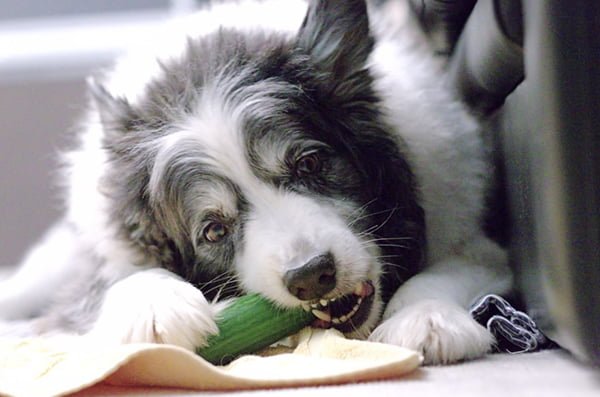Many dogs enjoy having bites of human food now and then, but it's important to remember that just because a food is healthy for humans doesn't mean that it's safe for dogs. Cucumbers are a favorite vegetable of many people, so you may wonder - can a dog eat cucumbers? Can dogs eat cucumbers raw? Are cucumbers good for dogs to eat? Below, we'll tell you all about if cucumbers are safe for dogs, how cucumbers can benefit your dog's health, and how to feed cucumbers to your dog!
Can Dogs Eat Cucumbers?
Yes, dogs can eat cucumbers! Cucumbers are perfectly safe for dogs to eat, and are even beneficial! While a dog gets all the nutrients they need from a regular, well-formulated dog food, cucumbers are a healthy alternative to training treats and other human foods. There are a few potential risks that can be easily avoided.
Health Benefits Of Cucumbers
Cucumbers are one of the best human foods to add to a dog's diet!
Vitamins
Cucumbers are excellent sources of vitamin C and vitamin K! Vitamin C is crucial for supporting the immune system. Vitamin K is necessary for healthy blood clotting and wound healing, and will keep your dog's bones strong!
Minerals
Cucumbers contain potassium and magnesium - two essential minerals! Potassium is needed for fluid regulation and strong muscles. It also helps the body transmit nerve signals. Magnesium also helps the muscular and nervous systems, but it also helps to regulate blood pressure and blood sugar levels.
High Water Content
Fresh cucumbers are deeply hydrating. They are over 97% water! Having such a high water content also means that cucumbers low in calories and in sugar. This makes them the perfect low calorie, healthy treat for dogs that have weight concerns or have diabetes. Think about it - one medium dog biscuit has 40 calories. One cup of cucumber slices has 16 calories and 1 gram of sugar!
Eliminates bad breath
Cucumbers have phytochemical and phytonutrients that can help your dog to eliminate bad breath! With the high water content, it can help flush out odor causing bacteria. However, feeding your dog cucumbers shouldn't replace brushing their teeth and is not a substitute for proper dental care, but it does help the ones with stinky breath. If your dog does have persistent bad breath, speak with your veterinarian.

Source: Flickr
The Downside To Dogs Eating Cucumbers
Even a healthy treat can have a downside.
Overeating
It's possible for dogs to eat too much cucumber. Too much of any food can cause stomach upset, diarrhea, gas, and vomiting - particularly if it's a new food. Remember that a dog's daily diet should consist mainly of well-formulated dog food. Only 10% of their daily calories should come from treats - even healthy ones. How much cucumber fits into that 10% depends on the size of your dog. Small dogs shouldn't eat more than two cucumber slices, whereas those extra-large dog breeds can enjoy a generous handful.
Choking Hazard
If a cucumber is not prepared properly, it can pose a choking hazard - particularly in small breeds. Large pieces could get stuck in a dog's throat, or cause an intestinal blockage. Never offer your dog a whole cucumber. To keep cucumbers safe for dogs, cut them into thin slices or small chunks.
What Is The Best Way For Dogs To Eat Cucumber?
Just like you would with all fruits and vegetables, wash cucumbers thoroughly before feeding them to your dog, to remove any residual dirt and chemicals. If you'd like, you can remove the cucumber skin with a vegetable peeler or knife. Then, slice the raw cucumber into thin slices! Feeding cucumbers to your dog is as simple as that!
To use raw cucumbers as training dog treats, it's more manageable to cut cucumber into bite-sized pieces, rather than mess with a stack of slices.
Here are some fun ways to incorporate this healthy snack into your dog's diet!
Pop cucumber slices in the freezer, and bring them out as a refreshing treat on a hot summer day! Frozen cucumber is also great for teething puppies.
Cut out the center of the cucumber slice and stuff the hole with peanut butter or cream cheese.
Blend chopped cucumber up with watermelon, blueberries, and bananas. Then, fill a KONG or similar toy with this mixture, put a dab of peanut butter over the opening to seal it, then pop it in the freezer. This lick toy will be refreshing and mentally stimulating!
Top a bowl of regular dog food with slices or small chunks of cucumber, as a fun little surprise.
Frequently Asked Questions
Can Dogs Eat Pickled Cucumbers?
No, you should not feed your dog pickled cucumbers. When cucumbers are pickled, they are placed in a brine that contains excessive salt. The brine also might contain garlic and onions, which are dangerous for dogs.
Can Dogs Eat Cucumber Seeds And Skin?
Typically, yes - dogs can eat cucumber seeds, and it's not necessary to peel the cucumber first. However, it is true that cucumbers contain a toxic compound called cucurbitacin. This compound is mostly found in the roots, stems, and leaves of the plant. A small amount can spread to the fruit itself. It's too small an amount to be dangerous, but it can make the peel and seeds of a cucumber taste bitter. If your dog seems to be bothered by cucumbers, consider offering peeled cucumbers with the seeds removed.
Can Dogs Eat Cooked Cucumber?
Depending on what other ingredients have been added, yes - dogs can eat cooked cucumber. Typically, we humans enjoy cucumbers raw. However, there are some favorite side dishes that involve cooked cucumbers, and so long as they don't include garlic and onions, it's fine to give your dog a piece. However, your dog might not be interested. Cooked cucumber has a much different texture than raw cucumber.
